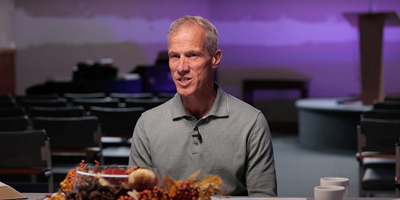Moses authored one psalm and it is one of five psalms that have the word “prayer” in their title. After considering God’s endlessness and man’s brevity of life, he brought some requests to God. The first one was:
“So teach us to number our days, that we may gain a heart of wisdom” (Psalm 90:12)
Moses’ appeal to God was wise and is insightful for all of us. It is a prayer that we can repeat whether we are 8 or 80 years old. The tendency when we are young is to live life thinking that we will be here forever. When at the opposite end of the age spectrum we can lapse into thinking our best days are behind us and there is nothing much we can do. Those who are busy in life do not often take the time to reflect on how time can be best used to glorify God. Let’s consider three applications arising from Moses’ prayer.
Our days of life are short
When I was 16 years old, reaching 65 years of age seemed a long way off. It was virtually unimaginable to me that the elderly had once been my age. Yet, just 40 years later, that age is not far off, but I can still remember being 16 years old! “Where has time gone?” is the often-heard cry. “The years just fly by as you get older” seems an absurd statement, given that they are always 365 or 366 days long, but that is the perception as we get older.
Moses recognised that our time on earth is brief:
“The days of our lives are seventy years; and if by reason of strength they are eighty years” (Psalm 90:10a).
In the light of eternity, the days of life, even if we live to what we consider to be old age, are short:
“For it is soon cut off, and we fly away” (Psalm 90:10c).
To “number our days” means to live in the determined awareness that our days are brief and we will not live here forever. Each day that is given to us is a gift from God. It is a day that we can choose to live for His glory or without thought towards Him.
Although often repeated, two lines from C. T. Studd’s poem, “Only one life”, are worth meditating upon.
“Only one life, ’twill soon be past, only what’s done for Christ will last.”
Our days of life are troublesome
Moses recognised that we live in a fallen world and thus it is filled with trouble:
“Yet their boast is only labour and sorrow” (Psalm 90:10b).
In the book of Job, Eliphaz reminds us of that truth:
“Yet man is born to trouble, as the sparks fly upward” (Job 5:7).
Although we strive to eliminate trouble and sorrow from our lives it is a fight we will not and cannot win. We may try to fill our lives with comforts and pleasures to eradicate any pain, but these do not last and cannot ultimately satisfy. Our days on earth are lived in a world marked by the consequences of the fall, and we cannot avoid experiencing these.
Therefore to “number our days” means we do not long to live here forever but we long to be with the Lord Jesus Christ and have “endless days” where there are no tears or sorrows.
“And God will wipe away every tear from their eyes; there shall be no more death, nor sorrow, nor crying. There shall be no more pain, for the former things have passed away” (Revelation 21:4).
Our days of life are times of opportunity.
The reason that Moses asked the Lord to teach us to number our days is so that we “may gain a heart of wisdom”.
We need wisdom, as we count our days, to make good use of the opportunities that God gives us. The saying “Why do today that which can be put off until tomorrow” may raise a wry smile but it should have no place in our thinking. John Piper, in a recent blog post about being productive, exhorted readers to “act promptly as soon as you feel that your mind is ripe for taking action.”
Although we are not all promised the same measure of things in this life, one thing we are all promised is that our life will soon end and we will stand before the judgement seat of Christ (2 Corinthians 5:10). There, before our Saviour, we will give an account of how we used the days that God entrusted to us.
Let us then pray the prayer of Moses, “So teach us to number our days, that we may gain a heart of wisdom”.
































